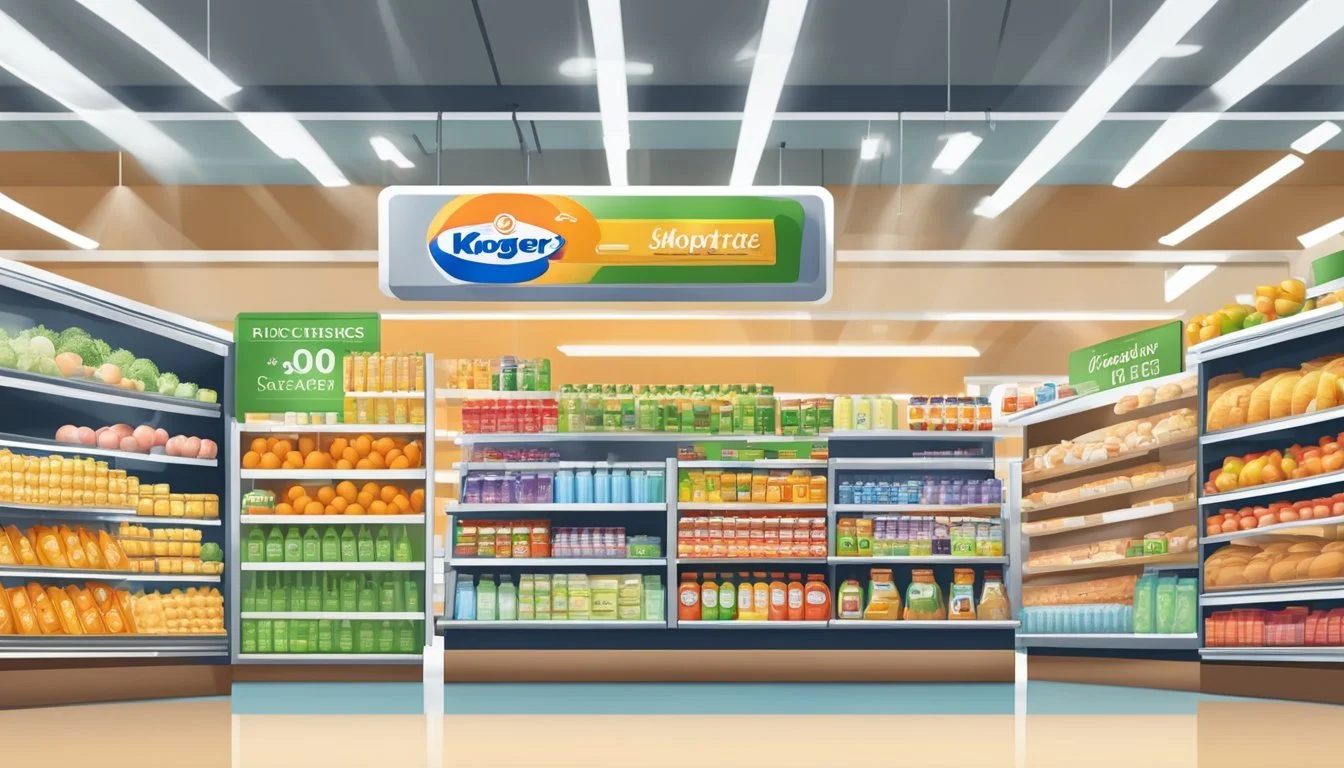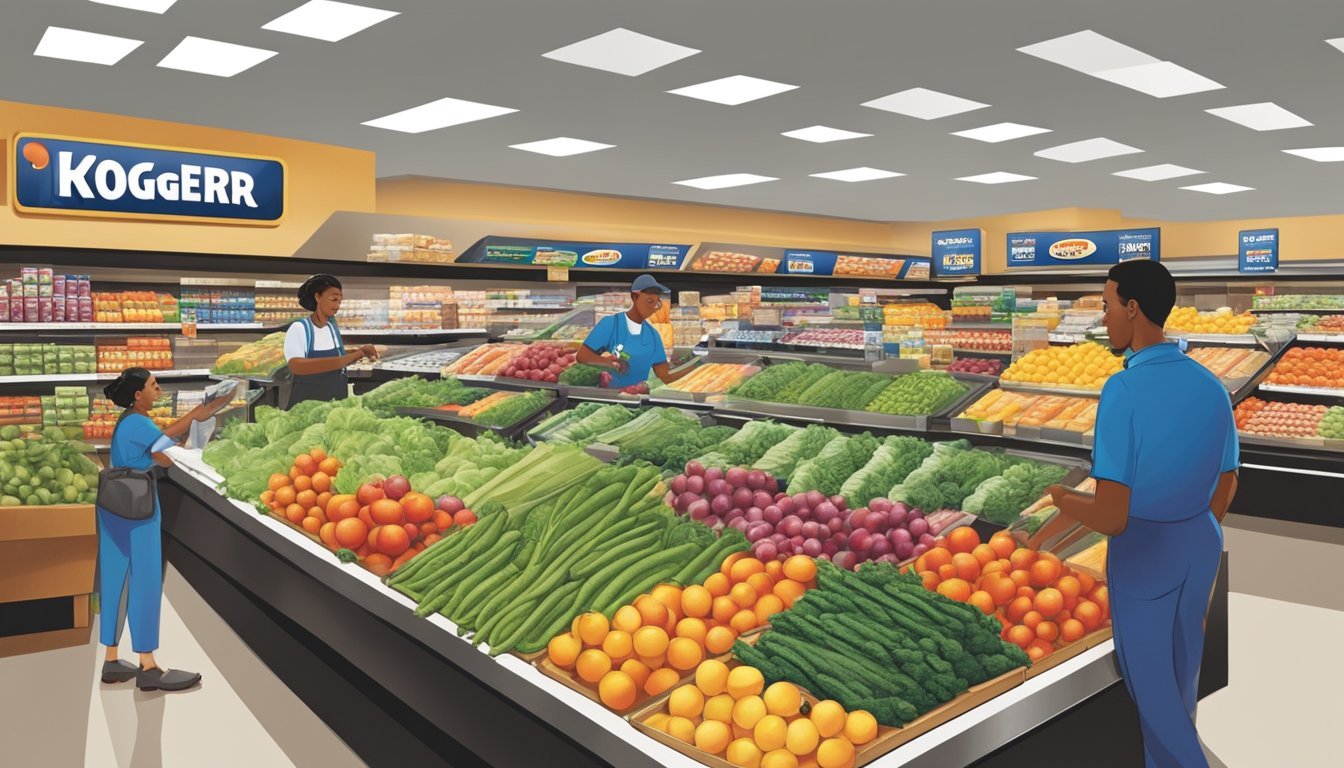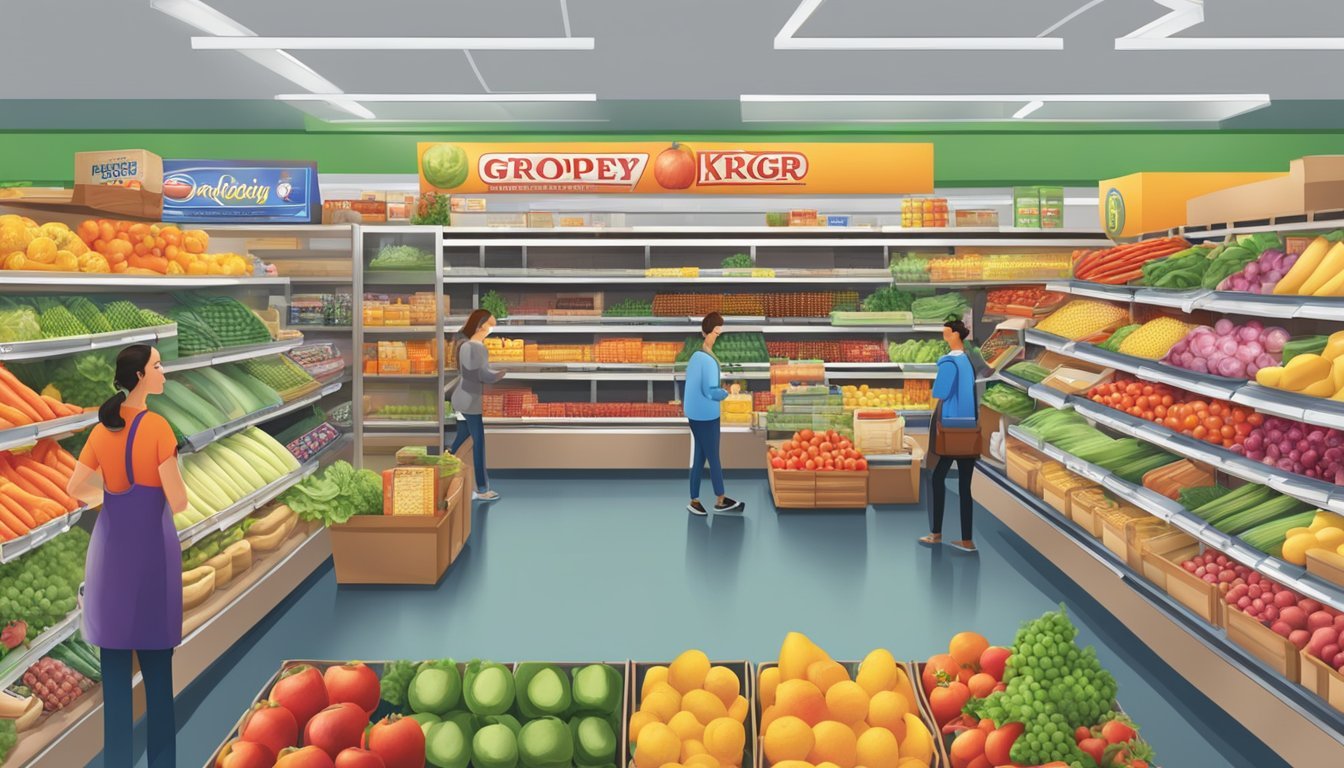Kroger vs ShopRite
Comparing Quality, Prices, and Selection for the Best Shopping Experience
When comparing grocery stores, shoppers often weigh various factors such as price, quality, and selection. Kroger and ShopRite are two major players in the supermarket sector that often come up in discussions about which provides a better shopping experience. Kroger, one of America's largest grocery chains, is known for its wide selection and commitment to local produce.
ShopRite, while smaller in scale compared to Kroger, holds a significant presence in the Northeast and is recognized for competitive pricing and a strong store brand offering. Both stores have their own loyal customer bases and unique selling points. The following comparison considers various aspects, including product variety, pricing strategies, and overall customer satisfaction.
History and Company Profiles
When comparing Kroger to ShopRite, it is essential to consider the distinct histories and company profiles of these prominent grocery chains. Each has its own geographical footprint and operational model, reflecting their long-standing presence in the supermarket sector.
Kroger Background
Kroger is one of the largest supermarket chains in the United States. Founded in 1883 by Bernard Kroger in Cincinnati, Ohio, it began as a single grocery store with a strong commitment to quality, under the belief that one should never sell anything one wouldn't want for themselves. Fast-forward to today, Kroger operates approximately 2,719 grocery retail stores in 35 states and the District of Columbia. The stores are a combination of food and drug, multi-department, marketplace, price-impact warehouse stores, and e-commerce. It operates under several banners, including not only the Kroger stores but also Harris Teeter, Fred Meyer, and more, which together create a significant presence in the country's supermarket sector.
ShopRite Background
ShopRite presents a contrast as a retailers' cooperative of supermarkets. The brand has its roots in a sales cooperative of privately owned supermarkets in the northeastern United States. Specifically, ShopRite has stores in six states: Connecticut, Delaware, Maryland, New Jersey, New York, and Pennsylvania. This cooperative network is managed by Wakefern Food Corporation, which is based in Keasbey, New Jersey. Established by a small group of New Jersey grocers after World War II to deal with wholesale business challenges, ShopRite now comprises 50 member companies who individually own and operate over 300 stores. It offers a different business model from the corporate structure of Kroger, while still being a sizable presence in the region it serves.
Store Formats and Layouts
When comparing Kroger and ShopRite, one must consider the distinctive store formats and layouts that each retailer utilizes. These factors significantly impact shopping convenience and the overall cleanliness of the establishments.
Kroger Store Format
Kroger's format tends to be versatile, operating multi-department stores that may include furniture, electronics, and toys in addition to a full grocery selection. This format aims to provide a comprehensive shopping experience. The layout of Kroger stores typically adheres to a logical flow, promoting ease of movement and convenience. The stores are well-sectioned, with clear signage leading to an organized shopping journey. Cleanliness is a priority, with clean aisles and well-maintained facilities being a common theme among customer reviews.
ShopRite Store Format
ShopRite stores offer a format that focuses heavily on the grocery aspect, often featuring spacious layouts with wide aisles. This format emphasizes the convenience of finding groceries and food-related items without the distraction of unrelated merchandise. However, the ShopRite format also includes a strong emphasis on variety, with a wide range of products available to customers within the grocery domain. The stores are maintained with a commitment to cleanliness, ensuring a pleasant shopping atmosphere.
Product Selection and Availability
When choosing between Kroger and ShopRite, consumers consider the quality and variety of products each store offers, from the freshness of produce to the assortment of staples. Each store has distinct strengths in their product selection and availability.
Produce and Organic Options
Kroger boasts a strong focus on quality produce, often sourcing from local farms to provide fresh fruits and vegetables. They offer a diverse range of conventional and organic produce, ensuring that customers have access to healthy options. ShopRite also presents a robust selection of produce, including organic produce, catering to the health-conscious shopper with a commitment to freshness and quality.
Meat and Deli Selection
The meat and deli departments at Kroger are known for their variety, featuring high-quality cuts of meat and a vast selection of deli items. They prioritize partnerships with local suppliers, which is evident in the quality of their meats. ShopRite competes closely, with a meat selection that focuses on quality and an extensive deli offering various cheeses and prepared foods to accommodate every palate.
Staples and Grocery Items
When it comes to staples like rice, bread, and other grocery items, both Kroger and ShopRite carry an extensive array of products.
Kroger: Features a wide selection of staples, including an impressive in-house brand that offers affordability without compromising quality.
ShopRite: Known for its variety of brands and options, ShopRite ensures that consumers will find the grocery items they need, including specialty and international products.
Pricing and Deals
When comparing Kroger and ShopRite, consumers will notice differences in everyday prices and the variety of discounts and special offers each store provides. These factors are crucial when determining which store offers a more cost-effective shopping experience.
Everyday Prices
Kroger is known for competitive pricing and regularly features price standouts on staple items. Consumers can expect to find affordable options across various categories. However, prices can fluctuate based on location and market conditions. In contrast, ShopRite offers a different pricing model. While their everyday prices on certain items may be higher on average, they often provide savings through their Price Plus Club.
Kroger: Known for competitive pricing on staple goods.
ShopRite: Prices may be higher but can be offset by their loyalty program.
Discounts and Special Offers
ShopRite frequently features discounts through their membership program, and patrons with a Price Plus Club card can access exclusive deals, which often makes ShopRite a strong contender for those looking for lower prices. Kroger, on the other hand, provides a variety of weekly specials and promotions. They also offer a robust loyalty program that rewards customers with fuel points and personalized deals, enhancing the overall value for frequent shoppers.
ShopRite: Exclusive discounts available to Price Plus Club members.
Kroger: Weekly deals and additional savings for loyalty program members.
Customer Experience
When comparing Kroger and ShopRite, customer experience is pivotal, focusing on aspects like service quality and checkout efficiency that influence consumers' choices. Ensuring quality products, trust, and convenience are integral for both grocery stores to deliver superior service.
Service Quality
Kroger has invested significantly in leveraging technology to enhance service quality. They offer digital coupons that customers can add to their loyalty cards and an in-app system for navigating stores. ShopRite also provides a solid customer service experience, with a focus on stocking common items and providing high quality of products. Both stores are trusted by shoppers, but Kroger's use of data and analytics to understand customer behavior allows them to stock items that cater to customer expectations efficiently.
Checkout Efficiency
For checkout efficiency, ShopRite offers dedicated express lanes and self-checkout options designed for speed and convenience, as does Kroger. However, H-E-B (not directly compared here but mentioned for context) outperforms others in checkout experience, indicating there is room for improvement. ShopRite strives to manage checkout lines effectively even during peak hours, sometimes leading in customer trust regarding checkout conveniences. Kroger, known for its service innovations, is recognized for rethinking the traditional grocery shopping experience to improve checkout speed.
In summary, both Kroger and ShopRite aim to provide a streamlined customer experience, but their approaches to service quality and checkout efficiency differ, with each having its own strengths.
Brand Reputation and Trust
In the competitive landscape of grocery retailers, Kroger and ShopRite stand out for their brand reputations, shaped by consumer trust and their commitment to quality assurance. These facets are pivotal to their success and are continually measured by customer surveys and research.
Consumer Perceptions
Surveys conducted by various researchers indicate that consumers place significant weight on trust when choosing their preferred grocery store. Kroger often earns a strong position in surveys aimed at assessing trust, which is reinforced by their array of fresh food and high-quality produce. ShopRite, on the other hand, also holds a commendable reputation, particularly in the regions it serves. Area consumers recognize ShopRite for its dedication to providing a selection of high-quality goods.
Kroger: Highly ranked in national trust surveys.
ShopRite: Well-regarded for quality in local consumer surveys.
Quality Assurance
Quality assurance is at the core of both Kroger's and ShopRite's operational policies. Kroger prides itself on offering fresh food and high-quality produce, aspects confirmed through consistent consumer feedback and industry quality checks. ShopRite similarly upholds a strong emphasis on quality, often showcasing its local farm partnerships and fresh-from-the-source offerings to assure customers of the produce's freshness.
Kroger: Reinforces quality through consumer feedback and regular quality checks.
ShopRite: Highlights local partnerships to ensure freshness and quality.
Grocery Delivery and Online Options
With the growing demand for convenience in grocery shopping, both Kroger and ShopRite have significantly expanded their online services for grocery delivery. They aim to provide a wide range of options and reliable service to meet the needs of their customers.
Kroger Online Services
Kroger offers a robust online platform, allowing customers to shop for groceries from the comfort of their homes. Delivery can be easily scheduled through their website or mobile app, where customers can browse a wide array of products. Kroger has partnered with external services to bolster its delivery capabilities and expanded its reach.
Convenience: Customers can enjoy scheduled delivery slots and same-day delivery options in certain areas.
Options: The platform features an extensive selection of items, from fresh produce to household essentials.
Service Fee: Delivery fees vary based on the order size and delivery window selected.
ShopRite Online Services
ShopRite provides its customers with a user-friendly online grocery shopping experience through its website and dedicated app. The grocery delivery service is designed to offer both convenience and variety, with a focus on timely service.
Convenience: ShopRite allows customers to order online and schedule a delivery or opt for in-store pickup.
Options: A comprehensive selection, including speciality items and organic produce, is available.
Service Fee: ShopRite's fees for delivery and service may differ depending on location and membership options, such as ShopRite’s Price Plus Club.
Comparison With Other Retailers
Kroger and ShopRite are significant players in the grocery store industry. Their performance and offerings are often measured against other national and regional chains to determine their competitive edge.
National Chains Comparison
When comparing Kroger and ShopRite to other national grocery chains such as Walmart and Target, it's clear that Walmart often leads in terms of value. Walmart's pricing is typically the most competitive, with basic grocery items costing less than many competitors. Target, while not as low-priced as Walmart, often includes specialty items and organic options that cater to a different market segment. Costco attracts customers through its bulk purchase model, offering cost savings over the long term, despite a required membership fee. Amazon, primarily through its acquisition of Whole Foods, has begun to offer the convenience of online shopping with the promise of quality goods, though prices are generally higher compared to Walmart and other discount retailers.
Walmart: Lowest prices, broadest market reach
Target: Slightly higher prices, emphasized on quality and specialty items
Costco: Bulk purchase savings, membership required
Amazon (Whole Foods): Online shopping convenience, premium prices
Regional and Specialty Grocers
ShopRite is known for its presence in the Northeast and competes with other regional stores like Stop & Shop. ShopRite often provides a balance of value and quality, while stores like Stop & Shop may have higher priced items. Specialty grocers such as Trader Joe's and Sprouts Farmers Market focus on unique, often organic and health-centric product selections. As a result, their prices may be higher, but they appeal to customers prioritizing quality and specialty products. Aldi represents a minimalist approach to shopping with limited selection and no-frills stores but is recognized for its low pricing structure and quality store brands, directly competing with the likes of Kroger on price and value.
Regional stores like Sprouts Farmers Market:
Stop & Shop: Higher prices, extensive Northeast presence
Trader Joe's & Sprouts: Focus on quality, health-centric offerings
Aldi: Low prices, limited selection but quality brands
In this landscape, Kroger and ShopRite continue to adapt by emphasizing their own strengths—Kroger with its nationwide network and customer loyalty programs, and ShopRite with regional familiarity and commitment to quality service.
Consumer Tips and Trends
In the ever-competitive grocery market, consumers constantly seek not just quality and selection but also the best value for their family's budget. Understanding how to maximize savings and track shopping behavior can make a significant difference in managing a household's grocery expenses.
Maximizing Value
Coupons and In-store Deals: Consumers should take advantage of Kroger's and ShopRite's rewards programs, frequently offering personalized deals and discounts on various categories and grocery items. Lists of deals can often be found in weekly flyers or through mobile apps, where digital coupons can also be applied directly to their rewards cards, leading to instant savings at checkout.
Bulk Purchases: Families can benefit from purchasing certain items in bulk, particularly non-perishable goods or grocery items with a longer shelf life. Kroger often features bulk discount sections, and using store-brand products can add to the savings. However, consumers must be cautious not to buy more than required, as this can lead to wastage.
Shopping Behavior
Trust and Brand Loyalty: Consumers tend to trust certain retailers based on their past shopping experiences. ShopRite has established a solid reputation for providing quality fresh produce and a diverse selection of national and store brands. Trust factors in heavily when a consumer decides where to shop regularly and should be considered alongside deals and discounts for the best overall value.
Strategic Shopping Lists: Efficient shopping behavior involves making comprehensive lists that categorize items and align with store layouts. This tactic not only saves time but can help avoid impulse purchases which often fall outside of the planned weekly or monthly budget. Both Kroger and ShopRite offer mobile apps that can help consumers create and manage their shopping lists effectively.








